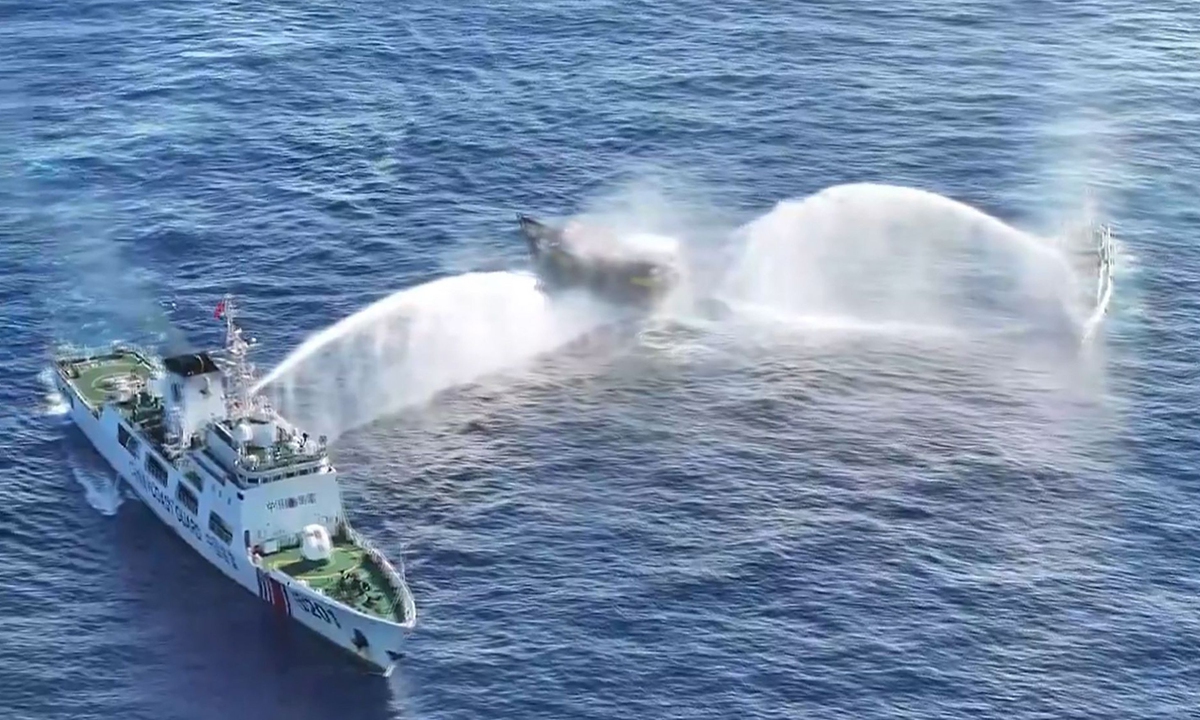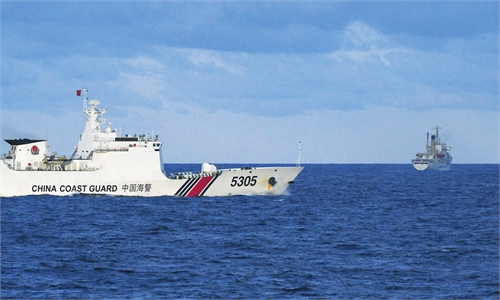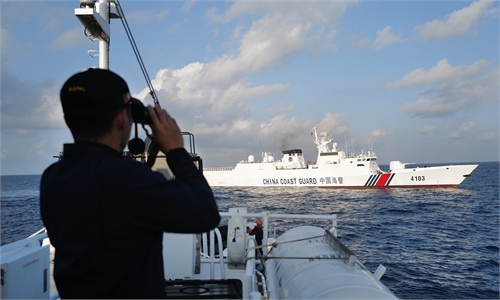Manila escalates South China Sea row as it continues trick of ‘playing victim’
China has rich toolkit to respond despite US being ‘biggest external disturbance’

Two Chinese law enforcement ships issue warning shots with water cannon at a Filipino vessel in waters off China's Ren'ai Jiao (Reef) in the South China Sea on March 5, 2024, as it makes dangerous approach to China Coast Guard Ship. Photo: VCG
The Philippines should not abuse China's restraint or underestimate China's determination and ability to safeguard its sovereignty and territorial integrity, Chinese analysts warned on Friday, after Philippine President Ferdinand Romualdez Marcos Jr vowed to take countermeasures against China Coast Guard (CCG), continuing to play the trick of being a victim and further escalating tensions in the South China Sea.
Analysts also called the US the "biggest external disturbance" to peace and stability in the South China Sea, saying that the Philippines' approach of putting pressure on China by relying on the US is actually "inviting a wolf into the house," and will not be welcomed by regional countries.
The Philippines will implement countermeasures that are proportionate and reasonable against "illegal, coercive, aggressive, and dangerous attacks" by CCG, Marcos said in a statement posted on Thursday on X, formerly Twitter.
The "attacks" Marcos referred to are CCG ships intercepting and firing water cannons at a Philippine supply vessel, which illegally and forcibly intruded into waters near China's Ren'ai Jiao (also known as Ren'ai Reef), ignoring repeated warnings from the Chinese side.
Marcos did not specify what the countermeasures would include. Citing two Philippine officials, Associated Press reported that Marcos' statement was made after meeting top Philippine defense and national security officials, who submitted their recommendations, which include the use of faster military vessels instead of chartered civilian boats when the Philippine navy delivers a new batch of personnel and supplies to Ren'ai Jiao.
"We seek no conflict with any nation," Marcos wrote on social media, but noted that the Philippines "will not be cowed into silence, submission, or subservience."
Chinese Defense Ministry spokesperson Wu Qian said on Thursday that the Philippines' harassment and provocations are the direct cause of the recent escalation of the South China Sea issue, and China will not allow the Philippines to act willfully.
"As the head of state, it is inappropriate and unfriendly for Marcos to speak out tough words in person, which may cause huge damage to bilateral relations. And his words will reduce, to a certain degree, the flexibility for executive departments to operate," Wu Shicun, president of the National Institute for South China Sea Studies, told the Global Times on Friday.
On Friday, Philippines' Department of National Defense spokesperson Arsenio Andolong repeated Marcos' claim that "Filipinos do not yield," and accused China of "intimidating smaller countries," ABS-CBN NEWS reported.
According to Ding Duo, deputy director of the Institute of Maritime Law and Policy at the China Institute for South China Sea Studies, the Philippines may continue its trick of "playing victim" to the global audience, and thus smear and attack China through "cognitive warfare."
Manila may arrange for another group of reporters from the West in their provocative missions of "sending supplies," and make their voices louder through "experts" and hawkish former officials, Ding said.
Manila may also strengthen the joint activities in these hotspots and key waters such as Huangyan Dao and Ren'ai Jiao, and carry out provocations, said Ding.
The Philippines has abused China's restraint and goodwill, underestimating China's determination and ability to safeguard our territory and sovereignty, Wu said.
Ding said China has a rich toolkit for responding to the Philippines' further provocations. "Whether it is the Philippines itself or colluding with countries outside the region, the waves they raise in the South China Sea are within our ability to respond."
Meanwhile, we will act in line with the principle of maintaining peace and stability in the South China Sea, said Ding.
US instigation
According to experts, Marcos' tough words serve domestic political purposes when he needs to shift Filipinos' discontent over his administration's performance on livelihood and the economy, and are also a response to the "support" from countries outside the region, including the US.
In a telephone call with Philippine defense chief Gilberto Teodoro Jr. Wednesday, US Defense Secretary Lloyd Austin reiterated a warning that it is obligated to come to the aid of the Philippines under a 1951 Mutual Defense Treaty if Philippine forces, aircraft and ships come under armed attack, including anywhere in the South China Sea, according to AP.
Furthermore, leaders of the US, Philippines and Japan will meet for their first trilateral summit at the White House in April, according to a US official statement. Analysts believe that Washington is getting involved in the Asia-Pacific with increasing strength and resources.
"The US is the biggest external disturbance to peace and stability in the South China Sea," Ding said, "without instigation from US, it is more likely that China and the Philippines would manage their differences through negotiation and consultation."
The US is trying to reshape the strategic environment around China by strengthening its military alliance with the Philippines to intervene in the South China Sea issue, but it is useless and may even backfire when they use their "mutual defense treaty" to threaten China, said Ding.
Experts said that given the pro-US stance of Marcos' cabinet members and the military, the possibility for Beijing-Manila ties to return to the Duterte era is very slim, however, a large-scale military clash at sea is also unlikely.
China's ability to safeguard its territorial sovereignty and maritime rights and interests in the South China Sea, as well as its ability to maintain peace and stability in the South China Sea, are constantly improving, Ding said.
In addition, regional countries are well aware of the Philippines' behavior as a troublemaker that "leads the wolf into the house," Ding said. "The majority of ASEAN members do not want the South China Sea issue to affect their normal cooperation with China. And if the Philippines insists on provocations, it is believed that Manila will not be welcomed within ASEAN, and some restraints may be carried out against the Philippines."
The Philippine side should learn from the past conflicts on Meiji Jiao of the Nansha Islands. If repeated, normal ministerial exchanges, high-level visits and personnel exchanges between China and the Philippines will be affected, Wu warned.


